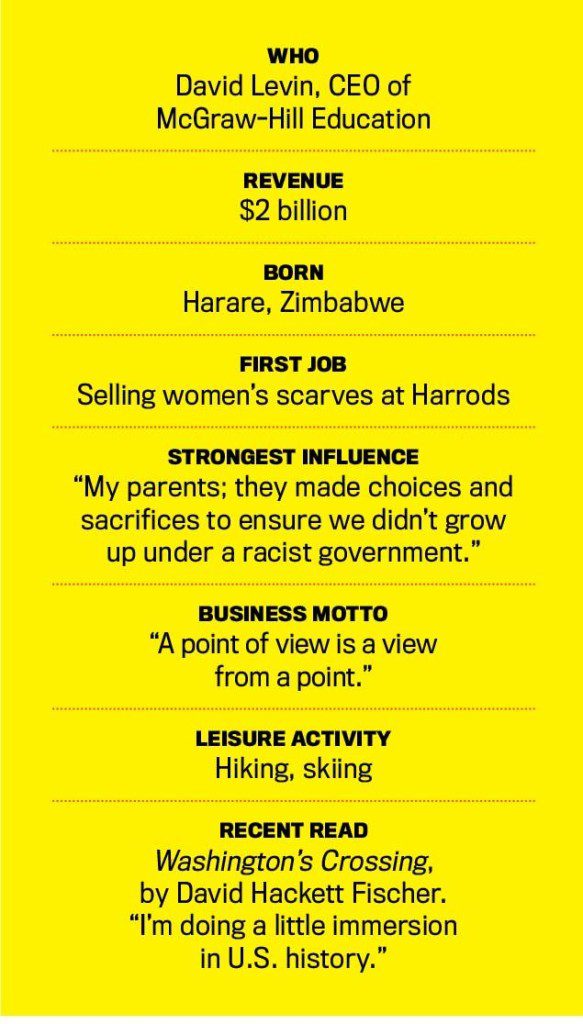 In the Summer of 2013, David Levin was wrapping up a seven-year tenure as CEO of London-based multinational media company UBM when a mystery opportunity came his way. “A search firm told me they had a perfect fit for my background in media transitions and technology—but they couldn’t tell me what it was yet,” he recounts. “So we had this bizarre set of encounters while they interviewed me without telling me anything about the sector or the company.”
In the Summer of 2013, David Levin was wrapping up a seven-year tenure as CEO of London-based multinational media company UBM when a mystery opportunity came his way. “A search firm told me they had a perfect fit for my background in media transitions and technology—but they couldn’t tell me what it was yet,” he recounts. “So we had this bizarre set of encounters while they interviewed me without telling me anything about the sector or the company.”
Initially intrigued, when Levin discovered that the CEO post was at newly created McGraw-Hill Education—an entity formed when McGraw-Hill Cos. sold its education unit to Apollo Global Management—his interest level plummeted. “I said, ‘I know its legacy, I know its structure and I know where it is in the market. I have zero interest.’”
His reluctance was understandable. After all, poor performance and poor prospects for growth were why the unit—which focused on the pre-K through grade 12, higher education and professional services markets—had been sold off by McGraw-Hill in the first place. Activist investors pressured the company to make the divestiture, arguing that the education unit’s deteriorating prospects were hobbling its more profitable ratings and financial businesses. Over time, however, Levin came to believe that the new entity’s growth prospects were not quite as dismal as the market supposed.
It helped that its current mission—to transform McGraw-Hill Education from a textbook publisher into a provider of education technology—aligned well with Levin’s leadership experience. At UBM, he had been charged with shifting the company’s business models from print to live events and online communities.
“I found the underlying area of what will be happening with education and technology very exciting,” he explains. “My predecessor, who was coming up for retirement, had begun a series of important moves to position the technology base. The challenge of turning what the market deemed a non-growth company into a growth company was very exciting. By the fall, I had moved from being completely disinterested to being completely captivated.”
Since taking the helm in January of 2014, Levin has moved swiftly on that transformation imperative. While McGraw-Hill Education still sells the pricey textbooks for which it’s best known, the company is steadily moving away from traditional publishing toward software-based learning materials that will be sold through subscriptions. The change goes far beyond simply digitizing
text so that students can download textbooks rather than purchase them or view class materials on PDFs. “By injecting software into the product, you’re not only able to provide the content but to produce rich streams of data for the student and the instructor about what’s working and what isn’t working,” explains Levin, who says that the technology will ultimately provide a customized learning experience.
For example, when students complete a questionnaire at the end of a chapter, the software can use those answers to reconfigure itself to customize the learning experience. “It can say, ‘before you go on to the next chapter, you need to understand this concept,’” explains Levin, who notes that McGraw-Hill Education is investing $175 million a year on developing its own proprietary learning software. “It can provide a set of gates and highlight the content that that particular student may need to review.” Furthermore, data on how students engage with the software can be shared with teachers, who can use it to identify what topics to review in class or where individual students are struggling.
The learning software is already gaining traction. In the 12 months ending September 30, 2015, digital sales accounted for 43% of all text sales in higher education, a bump from 27% in 2013. While the company is still operating at a loss, Levin is confident that things are moving in the right direction.
 “We knew as we went through that [transformation] that the challenge was ‘What’s our right to exist,’” says Levin. “Every business needs a raison d’être. This year, we flipped the business model very aggressively.”
“We knew as we went through that [transformation] that the challenge was ‘What’s our right to exist,’” says Levin. “Every business needs a raison d’être. This year, we flipped the business model very aggressively.”
Reflecting on what he would tell other CEOs embarking on a transformation journey, Levin offers advice gleaned from “If,” a famous Rudyard Kipling poem, to “keep your head when all about you are losing theirs and blaming it on you.” He recounts, “When I was 13 years old, I became smitten with that poem and it has become my touchstone since then—and I commend the rest of the poem as core life advice. The only thing in life you can control is your own behavior.
When you are shaping a culture, you need to be aware of how people respond to you because they will emulate how you lead, how you behave and how you act.”

Chief Executive Group exists to improve the performance of U.S. CEOs, senior executives and public-company directors, helping you grow your companies, build your communities and strengthen society. Learn more at chiefexecutivegroup.com.
0

1:00 - 5:00 pm
Over 70% of Executives Surveyed Agree: Many Strategic Planning Efforts Lack Systematic Approach Tips for Enhancing Your Strategic Planning Process
Executives expressed frustration with their current strategic planning process. Issues include:
Steve Rutan and Denise Harrison have put together an afternoon workshop that will provide the tools you need to address these concerns. They have worked with hundreds of executives to develop a systematic approach that will enable your team to make better decisions during strategic planning. Steve and Denise will walk you through exercises for prioritizing your lists and steps that will reset and reinvigorate your process. This will be a hands-on workshop that will enable you to think about your business as you use the tools that are being presented. If you are ready for a Strategic Planning tune-up, select this workshop in your registration form. The additional fee of $695 will be added to your total.

2:00 - 5:00 pm
Female leaders face the same issues all leaders do, but they often face additional challenges too. In this peer session, we will facilitate a discussion of best practices and how to overcome common barriers to help women leaders be more effective within and outside their organizations.
Limited space available.

10:30 - 5:00 pm
General’s Retreat at Hermitage Golf Course
Sponsored by UBS
General’s Retreat, built in 1986 with architect Gary Roger Baird, has been voted the “Best Golf Course in Nashville” and is a “must play” when visiting the Nashville, Tennessee area. With the beautiful setting along the Cumberland River, golfers of all capabilities will thoroughly enjoy the golf, scenery and hospitality.
The golf outing fee includes transportation to and from the hotel, greens/cart fees, use of practice facilities, and boxed lunch. The bus will leave the hotel at 10:30 am for a noon shotgun start and return to the hotel after the cocktail reception following the completion of the round.